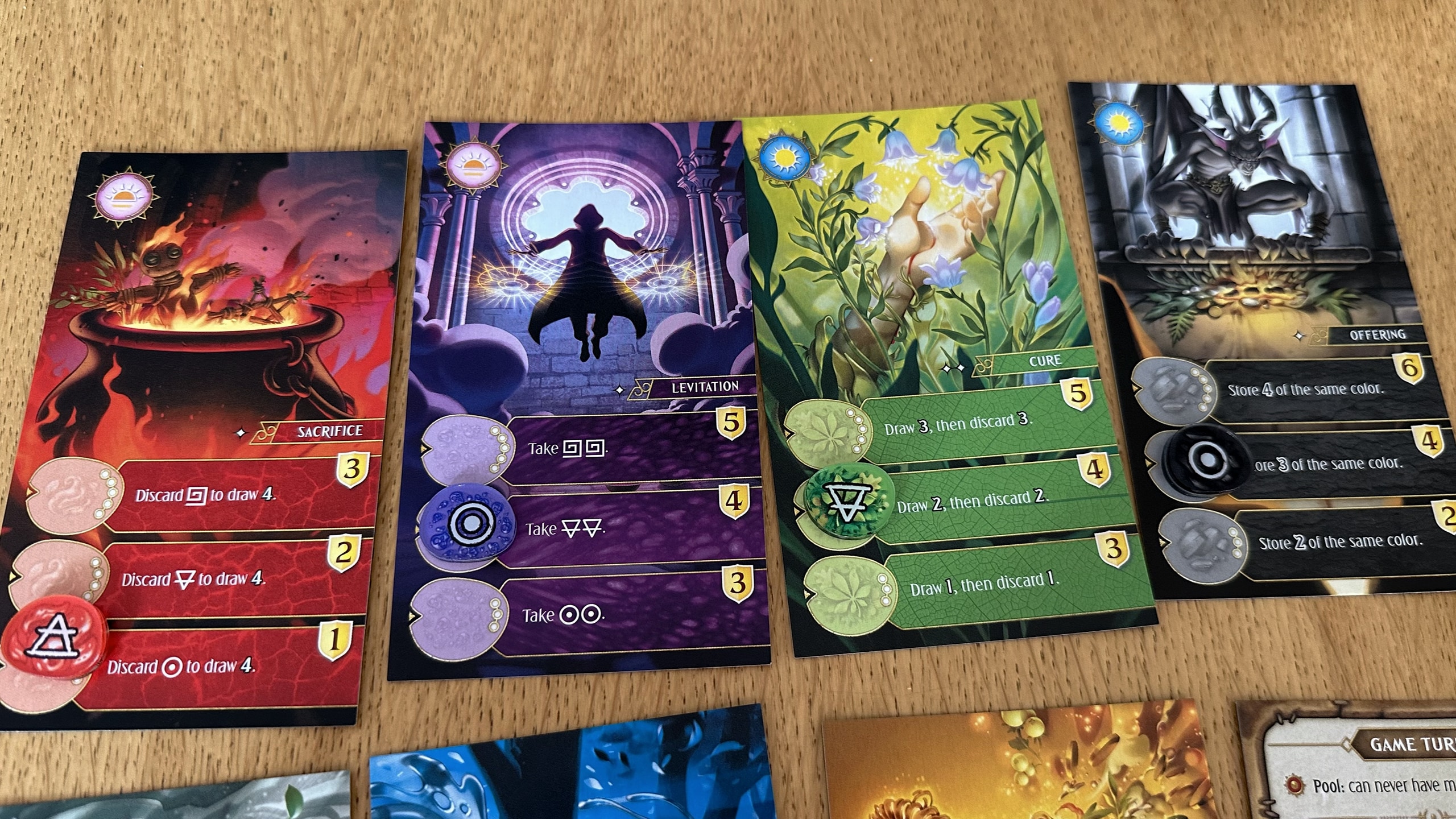
SpellBook by Phil Walker-Harding and Space Cowboys.
I received a review copy from Asmodee Nordics.
Elevator pitch: SpellBook is a race of collecting magical resources, using them to unlock spells and then using those spells to unlock more spells.
What’s in the box? There’s a bunch of spell cards and a familiar board for each player, a storage board, a bowl for resources, and lots of magic material tokens. The tokens are not cardboard, but clear acrylic with a picture layer in the middle. I haven’t seen that before, and I like it: it looks as good as cardboard tokens but feels better. The art is by Cyrille Bertin and is colourful and pretty. The game looks pretty good, and everything works well enough.
What do you do in the game? Your turn consists of three steps. First, you do a morning action, then a midday action, and finally, an evening action. In the beginning, you can only do the default actions. In the morning, you either draw two Materia tokens from the bag or choose one from the altar board. Midday, you can store one Materia token on your familiar board (where it’s stuck but gains you points). In the evening, you can learn one spell.
The spells cost Materia: each spell matches a colour of Materia and has three levels, 3, 4 and 5. The level tells you how many tokens you have to pay. Tokens also have runes, and you can use a set of three identical runes as a wild. You can only learn each spell once, so it’s a question of whether I learn the lower level now or delay so I can get the better level later.
The spells provide you with better versions of the default actions (“take two Materia with specific runes”, “store three Materia of the same colour”, “learn a spell with a discount”). Some have helpful one-time effects, some give you extra capabilities, and some provide end-game bonuses.
Finally, you add a resource token to the altar board, and it’s the next player’s turn. The game goes on until someone learns their seventh spell or when someone fills their familiar board. The round is finished, and points are calculated from the spell values and the familiar board.
Lucky or skilful? The only luck element is the Materia bag. I suppose you can play in a way that relies heavily on luck and then be disappointed when you draw the wrong colours. However, I didn’t find the luck of the draw annoying; it’s pretty much what I expected.
Abstract or thematic? The wizard theme is fine, but it’s a pretty abstract game. Splendor didn’t exactly feel like trading in gemstones, either. The art is pretty and helps make the game feel more evocative.
Solitaire or interactive? This is very much a multiplayer solitaire race. Some spells care about other players, but the interaction is very low: you either give resources to other players (to get more yourself) or copy available actions from another player. Sometimes you may want to pick a resource from the altar to hinder an opponent, but it’s rare.
Players: 1–4. The solitaire game is exactly like the multiplayer game played against a timer of 17 rounds with an increasing point threshold to beat. The game works with any player count; it’s just faster with fewer players.
Who can play? The age recommendation is 12+. The game is a straightforward family game, so kids younger than that can play it, especially if they’re experienced gamers. There’s some text on the cards, but it’s all public, so the language barrier shouldn’t be too bad.
What’s to like? The core loop is straightforward and solid. The basic question of which spells to learn, in which order and at which levels is interesting. The game has three sets of spells; you can randomize them for over 2,100 combinations. Figuring out the best approaches to the random sets is the best way to play.
What’s not to like? The core loop is simple and repetitive. I found the game fine, but it doesn’t feel addictive like Splendor or Res Arcana, which are the most obvious comparisons to me. Sometimes the best solution to a set of spells can be boring. Our first game had someone rush the ending with a single storing spell – that felt quite flat.
My verdict: I tried the game with four players, two players, and alone. The solitaire game doesn’t do anything for me. I was pleased to learn I enjoyed both the faster two-player and slower four-player games. I can see how someone can enjoy this game and how this can be a good family game for someone. At the same time, I know I’d rather be playing Res Arcana if I crave a game about magic and spells in this weight and length category.
On the scale of Enthusiastic, Suggest, Indifferent or Avoid, SpellBook gets Indifferent.

